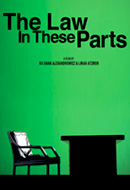settlements
 Justice in a Gray World
Justice in a Gray WorldMonday, December 31, 2012 by Robert Nicholson | Jewish Ideas Daily » Daily Features
The Law In These Parts, a new documentary that places the blame for Palestinian woes on Israel's military lawyers, exhibits scant awareness of history—and limited knowledge of law.
 The Soul of the Sabra
The Soul of the SabraThursday, September 6, 2012 by Allan Arkush | Jewish Ideas Daily » Daily Features
For those who have been taught—by Peter Beinart or some other recent chronicler of Israel’s history—that Zionism only began to go awry after 1967, Patrick Tyler’s new book might come as a shock. Israel’s aggressive territorial ambitions didn’t emerge after the Six-Day War, Tyler argues, but antedated that (to his mind) avoidable conflict by more than a decade.
 What are Israel’s Rights in Judea and Samaria? Two Views
What are Israel’s Rights in Judea and Samaria? Two ViewsThursday, August 9, 2012 by JHH Weiler, Yaffa Zilbershats, and Avi Bell | Jewish Ideas Daily » Daily Features
Two differing views of a controversial report on the legality of Jewish settlements in territories seized in the Six-Day War.
 West Bank Blues
West Bank BluesWednesday, September 14, 2011 by Aryeh Tepper | Jewish Ideas Daily » Daily Features
Few groups are as demonized in public discourse as "the Jewish settlers" of the West Bank. To listen to the pundits, these international outlaws are single-handedly preventing the achievement of a utopian peace in the Middle East.
 Frail Reeds?
Frail Reeds?Wednesday, February 2, 2011 by Elliot Jager | Jewish Ideas Daily » Daily Features
Observing Egypt's current upheaval, a writer for the Hebrew daily Makor Rishon has ventured the thought that whatever happens there, and no matter who takes power, "the lesson for Israel is clear: Arab regimes cannot be trusted."
Editors' Picks
Are the Settlements Illegal? Michael Curtis, American Thinker. The Geneva Convention provides no clear determination as to who has rights of sovereignty over the West Bank.
Of States and Settlements Max Singer, Begin-Sadat Center. Instead of opposing the Levy Report, which affirms Israel's right to settle in the West Bank, advocates of a two-state solution should support it—because "the question of legality is separate from that of prudence."
Lessons From a Man of Peace Yossi Klein Halevi, Jerusalem Post. "Rav Menachem Froman taught me that, in order to make peace with the Muslim world, one needs not only to honor Islam but to love it."
Washington Post Says "Settlements" Rhetoric Overheated , Washington Post. Almost all of Israel's recent post-Oslo settlement construction is located in areas that a two-state solution would cede to Israel. The real roadblock to peace is Abbas.
Wardrobe Malfunction Shimon Peres, Spiegel. "I see it as a 'world spring' rather than an Arab spring," muses the Israeli President. "And you can't come to a world spring dressed for winter." (Interview by Hans Hoyng & Juliane von Mittelstaedt)
Broken Accords Barry Rubin, Rubin Report. By seeking and winning UN observer status, the Palestinians abrogated the terms of the Oslo Accords. So, why should Israel be expected to uphold them?
Facts on the Ground Nadav Shragai, Jerusalem Center for Public Affairs. Every Israeli prime minister since Yitzhak Rabin has supported urban contiguity between Maaleh Adumim and Jerusalem—and a planned road will ensure Palestinian contiguity as well. (2009)
1979: What Are the Settlements For? Yaacov Lozowick, Israel State Archives. Minutes of Israeli cabinet meetings from October 1979 reveal a dispute between Ariel Sharon and Ezer Weizman as to whether West Bank settlements were a security necessity or a liability.
Barak's New Bargain Mortimer B. Zuckerman, U.S. News. Ehud Barak’s new idea: incorporate some settlements into Israel and pull out of the rest of the West Bank. A retreat from Zionism—or a way to save it?
Settling for Peace Khaled Diab, Guardian. "I and you, Hakham Froman, can make peace in five minutes, because both of us are religious."

